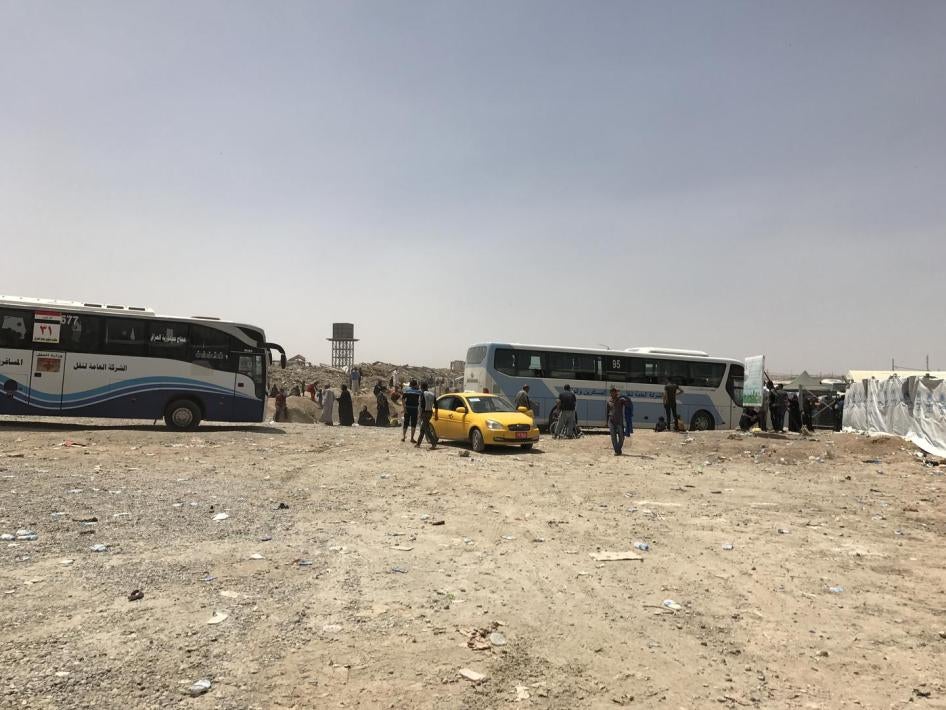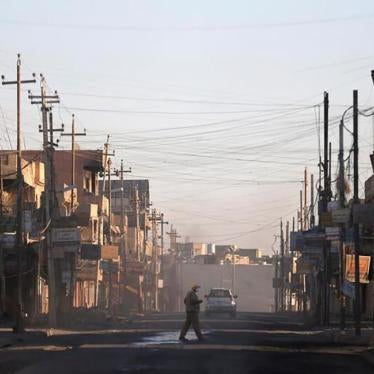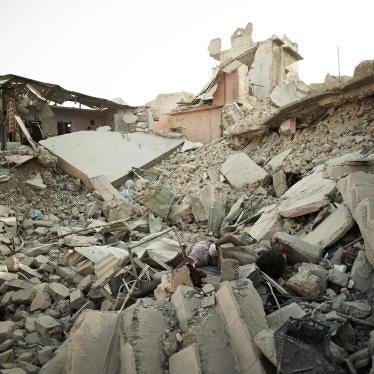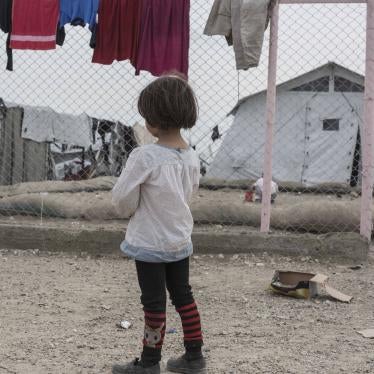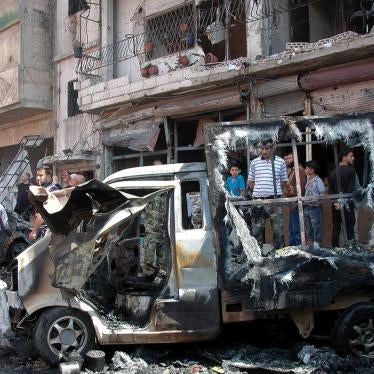(Beirut) – Iraqi authorities are holding more than 1,400 foreign women and their children who surrendered with ISIS fighters in late August 2017, Human Rights Watch said today. The detentions appear to have no legal basis and none of the detainees has been brought before a judge to assess the legality and necessity of their detention. The authorities should promptly charge or safely release them and confirm the whereabouts of up to 200 men and teenage boys, many foreign, who surrendered during the same period.
Beginning on August 30, Iraqi authorities detained the women and children next to a displaced persons camp in the town of Hammam al-Alil, 30 kilometers south of Mosul, then transferred them on September 17 to an informal detention site in Tal Kayf, 10 kilometers north of Mosul.
“Hundreds of foreign children risk being abandoned in a hellish twilight zone, with no legal identity and no country willing to take them,” said Bill Van Esveld, children’s rights researcher at Human Rights Watch. “Iraq, foreign countries, and international organizations should not let these children fall into statelessness, or consign them and their mothers to detention without charge.”
On September 10 and 11, Human Rights Watch visited the fenced Hammam al-Alil site, consisting of 17 large warehouse-style tents, which was controlled by Iraqi forces. Researchers conducted individual and group interviews with 27 foreign women. The family groups interviewed included no boys over 12 and no men. Two women were visibly pregnant, and dozens of children appeared to be under age 3.
The women and international humanitarian agency staff there said they included Afghan, Azerbaijani, Chinese, Chechen, Iranian, Russian, Syrian, Tajik, Trinidadian, and Turkish nationals. Reuters reported that they also included Algerian, French, and German nationals. Some women had identification documents but most said they did not. Most said they had traveled from their home countries to Turkey, then crossed into Syria before entering Iraq. Most of the children, particularly young children born in Iraq, had no birth certificates or ID documents.
An Iraqi military intelligence official who declined to give his name told Human Rights Watch at the site on September 10 that the women and children were being held “for their own protection.” There is no legal power under Iraqi law to detain people on this basis, nor is it legal to detain individuals merely because a spouse or parent was a member of the Islamic State, also known as ISIS. Under international law, Iraqi authorities may detain children only as a measure of last resort, and all detention needs to have a clear legal basis, be decided on an individual basis, and all detainees should be brought promptly before a judge to assess the legality and necessity of their detention.
In late August, the foreign women and children fled a military offensive that retook the Iraqi town of Tal Afar from ISIS, and surrendered to Kurdistan Regional Government (KRG) Peshmerga military forces, who held them temporarily in a school before handing them to Iraqi forces, said international humanitarian officials and the women.
Women interviewed by Human Rights Watch said that men and boys over 12 were separated, their hands tied, and lined up against a wall inside the school compound. Women who were there on August 28 said that a woman carried out a suicide attack at the school that day, after which the Kurdish forces killed six males, possibly including two boys, who were being held separately just outside the school compound. When the women were moved to Hamman al-Alil on August 30, the men remained and the women did not know what happened to them.
On September 17, Iraqi military officers and Transport Ministry officials arrived at Hamman al-Alil, loaded the women and children onto buses against their will and left with them, saying they had orders from Baghdad to move them to a military intelligence detention site in Tal Kayf, humanitarian officials who were there told Human Rights Watch. Iraqi authorities did not give them advance notice or say where the families were being taken. It is not clear if the women currently have access to humanitarian assistance and protection monitoring, which is cause for concern, Human Rights Watch said.
Col. Ahmed al-Taie from Mosul’s Nineveh Operation command told Reuters on September 10 that the Iraqi army was holding the women and children under “tight security measures” while “waiting for government orders” as to how to deal with them, including women he described as having been “deluded” by “vicious IS [Islamic State] propaganda.”
On September 12, the Norwegian Refugee Council stated that it would no longer manage the Hammam al-Alil site, where Iraqi military forces were present, because it could not be considered a humanitarian facility.
A KRG spokesman confirmed the suicide attack on August 28, but denied that Peshmerga forces had carried out the alleged extrajudicial killings. He said Peshmerga forces shot a man on August 30 because he was armed and carrying a bomb and threatened to kill a Yezidi captive and Peshmerga forces. The official said the Peshmerga had turned over to Iraqi security forces all the people who surrendered. Bodies found in Mosul since October 2016 suggested some Iraqi forces had extrajudicially killed suspected ISIS members there.
On September 16, Prime Minister Haider al-Abadi of Iraq stated in an interview that most of the women and children were not guilty of a crime, and that his government was “in full communication” with their home countries to “find a way to hand them over.” Human Rights Watch confirmed with humanitarian sources on September 18 that none of the women and children detained since late August at the Hammam al-Alil site had been repatriated.
Iraqi and KRG criminal justice authorities should investigate all alleged crimes, including unlawful killings, by any party to the conflict in a prompt, transparent, and effective manner, up to the highest levels of responsibility. Those found criminally responsible should be appropriately prosecuted.
Iraq should confirm the whereabouts of the missing men and boys, prioritize prosecution of ISIS members found to have committed the worst abuses, and consider alternatives to prosecution for people whose only alleged crime is ISIS membership or who entered Iraq illegally through Syria.
The Iraqi authorities should clarify the legal basis for holding the women and children, ensure all detainees are either charged with a crime and brought promptly before a judge, or immediately released, and are informed of their right to request consular assistance if they choose. Many of the foreign women apparently entered Iraq illegally, but not all are necessarily ISIS members. Iraq should work with international agencies to safely return foreign women who are not charged with a crime to their home country while considering the best interests of their children, taking into account the possibility that the mothers might be imprisoned. The government and international agencies should urgently identify durable solutions, including resettlement to third countries, for released women and children who cannot safely return to their home countries, including Syrian nationals.
While Iraq is responsible for ensuring the safety and security of the women and children, their home countries’ and other foreign embassies have a key role to play in finding durable solutions, including potential third country resettlement.
“The Iraqi government should ensure the women’s safe repatriation, asylum or resettlement if they release them, or fair trials if it charges them with violating Iraqi laws,” Van Esveld said. “It would be a terrible irony if children, who were notoriously victimized by ISIS, were forced to pay with their future for ISIS’s crimes.”
Fleeing Tal Afar
ISIS took control of Tal Afar in June 2014. Iraqi forces opened an offensive on August 20, 2017, and retook control of the city and the eastern parts of the district from ISIS fighters on August 26, and the rest of the province in late August. A United Nations humanitarian update published on August 29 reported that 20,000 people fled the area between August 14 and 22, but that 1,500 who remained in the city attempted to flee on August 26.
The women Human Rights Watch interviewed said they fled fighting in Tal Afar at various times on or after August 26, in groups ranging from about 20 to hundreds of people. The majority were foreign women and children, but there were smaller numbers of older, wounded, or fighting-age men. Most women said their husbands were also non-Iraqi, and had been killed in fighting in Mosul or more recently in Tel Afar. Many had lived in the al-Askari neighborhood in Tal Afar.
Those fleeing found themselves stuck in a zone between Iraqi forces advancing from the south and a front line held by Kurdish Peshmerga forces in the north. All the women interviewed said they had surrendered to Peshmerga forces, who later transferred them to the custody of Iraqi forces.
The women described passing the town of Ayadiya, 17 kilometers north of Tal Afar, before meeting Kurdish forces, in an area of active fighting along a route strewn with landmines. Five of the women said they saw body parts or dead people along the route and some said that they saw incoming fire that killed some people fleeing. In most cases they could not attribute the source of the attacks. One woman said she saw a 12-year-old boy hit by a gunshot that blew off his leg below the knee. Another woman said that she saw a helicopter fire on a group fleeing ahead of her.
Surrender to Kurdish Forces, and Alleged Killings of Boys and Men
The women consistently said that Peshmerga soldiers gave them water and food, and facilitated the evacuation of some of the wounded and sick in ambulances. Some women said the soldiers took their money or gold. All the women said that when they surrendered, Peshmerga soldiers separated women from men and boys ages 13 or 14 and older, and took everyone to an empty school compound, apparently in the village of Saleh al-Malih. At the school, the Peshmerga placed the women, girls, and younger boys in classrooms, and the men and older boys along the inside of one of the walls that enclosed three sides of the compound, with their arms tied behind their backs.
Women who were there on the afternoon and evening of August 28 described seeing between 150 to 200 men and boys on the inside of the compound wall. Two women said they saw an older, heavy-set man with white hair, wearing a red T-shirt, lying unmoving on the ground for hours and apparently dead, among the men and boys seated next to the wall. They said a Peshmerga soldier walked back and forth in front of the men and boys, hitting them with his belt. Three women also said that they saw a group of around 20 men in their 20s and 30s, whom they described as ISIS soldiers, with arms tied, outside an earth mound along the fourth side of the compound.
These women said they arrived at the school at around 10 or 11 a.m. and that at around 1 p.m., a foreign woman who was apparently being checked by female Peshmerga soldiers at the school entrance detonated a bomb she was wearing or carrying, killing and wounding Peshmerga soldiers and displaced people. A KRG official said the bombing killed three soldiers. A UN report stated that a suicide bomber killed a child and two women and wounded 11 people, including 6 civilians. One witness had a small scar on her face and a bandage on her left forearm, which she said were from injuries caused by the explosion.
Two women, interviewed separately, said that minutes later, they saw Peshmerga soldiers shoot at least six men near the earth berm. The women did not know the victims or whether any were children, but “two of them were young and the other four had beards,” one woman from Syria said. They said the men’s arms were tied and that they did not appear to pose a threat. Three other women also described hearing an explosion, followed within 5 to 10 minutes by gunshots. The women said that shortly afterward, a Peshmerga soldier in a white flatbed truck drove with the men’s dead bodies around the school compound, and that they saw soldiers put the remaining members of the group of men outside the berm onto other trucks and drive away with them. It is not known what happened to the men.
In a separate incident, a Syrian woman in her 20s said that Peshmerga forces shot her husband, who was Turkish, and another Turkish man, both ISIS members, after they surrendered on August 30:
My husband had told the Kurds that he would surrender us and give back our Yezidi slave girl, and they told him we could go to Turkey, but then we surrendered and he was talking with another [ISIS member]. I was six meters away from him. I heard gunfire and turned around and his bloody body was on the ground. The other [ISIS member] started running and they shot him down.
In response to Human Rights Watch, a KRG spokesperson stated that “government sources strongly reject the allegation” that Peshmerga forces extrajudicially executed men at the school at Saleh al-Malih on August 28. He said Peshmerga had unsuccessfully attempted to negotiate with the woman suicide bomber, who killed three soldiers and wounded two. On August 30, the spokesperson said, Peshmerga forces, who had been alerted by a Yezidi woman’s family that she was being held captive, shot and killed her Turkish captor when he arrived at their lines, threatening to kill her.
Transfer to Iraqi Forces; Disappearances of Men, Boys
The women said that Peshmerga soldiers held them at the school compound for varying amounts of time, not exceeding 24 hours, then loaded them and their younger children onto buses that took them to areas under the control of Iraqi forces, and ultimately to the Hammam al-Alil site. The military forces in control of the busses were Iraqi, not Peshmerga, soldiers.
The women described a large convoy of more than a dozen buses. Some women said that older men or wounded men were loaded onto the buses as well, but that most passengers were women and young children.
The women said that was the last they saw of the men and boys held along the school wall. Human Rights Watch interviewed women who were relatives of Turkish men ages 20, 43, 73, and around 45; an Azeri man in his 40s; and a Trinidadian man of 53 who last saw them at the school compound and do not know their whereabouts. Two Syrian women named eight women, four Syrian and four Azerbaijani, they last saw at the compound who had not turned up in Hammam al-Alil, and whose whereabouts they didn’t know.
Several women said Iraqi forces stopped their buses at checkpoints on the way to Hammam al-Alil, screened the passengers, and removed suspected ISIS members. At one of these stops, one woman said, a person whose identity was obscured by a mask identified 10 men and boys who were taken away by security forces that she could not identify, before the buses continued. A second woman said that Iraqi forces took her and other bus passengers into an empty building that was still under construction for screening.
Another woman, who was on a different bus, said that after it had passed two checkpoints, Iraqi security forces stopped it at a checkpoint in Hamdaniya, a Christian town 16 kilometers northeast of Hammam al-Alil, where a masked informant pointed out her Iraqi husband, age 56. A soldier took him and three other men from the bus to a prefabricated caravan at the checkpoint, and another soldier told her, “If he is innocent they’ll let him go.”
The woman, 39, has four young children, and insisted that her husband was not an ISIS supporter, and that the family had been in Mosul when ISIS took the city and had been unable to flee. Once the United States-led coalition started carrying out heavier airstrikes on Mosul, the family fled to Tal Afar, she said, where ISIS forces refused to let them leave.
According to international legal principles on the treatment of prisoners, Iraqi authorities have a duty to inform the families of the men who were taken off the buses, and to treat them humanely – regardless of whether they are ISIS supporters. Some Iraqi units have a record of enforced disappearances and executions of suspected ISIS members.
Treatment of the Women, Children
News media reported that Iraqi officials said Iraq was negotiating with the women’s home countries for their return. Human Rights Watch received information that the Azerbaijan embassy was pursuing the return of its nationals among the detained women and children.
Iraqi authorities should notify the women that they have the right to request consular support, and contact and facilitate consular access for women who wish to do so, while ensuring that women are not arbitrarily separated from their children except based on the determination that doing so would be in the child’s best interest. Iraqi authorities should ensure that women and children are not deported or repatriated if they would be at risk of persecution, torture, or unfair trials for their alleged Islamic State affiliation.
Iraqi authorities should protect the women and children from reprisal attacks, but not detain them or prohibit their freedom of movement unless they are suspected of specific crimes and have judge-issued warrants against them. Iraqi authorities and authorities in the women’s home states, if they are returned, should prioritize prosecutions for involvement in serious crimes.
Iraqi authorities should facilitate humanitarian access to them and their children, and ensure access to medical care and decent living conditions.
